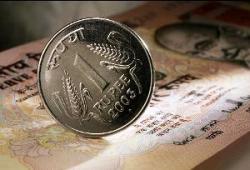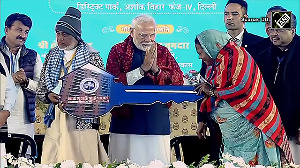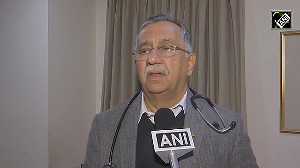 Inflation fell for the second consecutive month to a nine-month low of 8.58 per cent in October, which together with a slowdown in industrial growth may prompt Reserve Bank of India to halt its monetary tightening stance.
Inflation fell for the second consecutive month to a nine-month low of 8.58 per cent in October, which together with a slowdown in industrial growth may prompt Reserve Bank of India to halt its monetary tightening stance.
The 0.04 per cent decline in inflation from 8.62 per cent in September is significant, given that inflation stood at just 1.48 per cent in the same month last year.
As a result of the low base in September, 2009, the rate of inflation in September, 2010, appears elevated, which is known as the 'base effect'.
However, the decline in inflation may prove temporary, since it has become a trend nowadays for the numbers to witness frequent upward revision after being initially announced.
For the month of August, inflation has been revised to 8.82 per cent from the earlier provisional estimate of 8.51 per cent.
Commenting on the latest inflation data, Finance Minister Pranab Mukherjee said on Monday the RBI's monetary actions have helped to bring down the rate of price rise, but supply side constraints were exerting pressure.
"From April, 2009, to September 16, 2010, we have increased cash reserve ratio by one percentage point.
"We have increased repo rate 1.5 per cent. We have increased the reverse repo by 1.75 per cent. That has come effects. Inflationary pressure is coming from supply side also," he said.
Mukherjee noted that the international situation also impacts inflation.
"International situation has its own impact," he said.
In October, food items like onions and other protein-based articles felt the maximum inflationary pressure.
Onion prices rose by 24.07 per cent in just a month as parts of Maharashtra, which is the biggest producer of the vegetable, saw large-scale crop damage due to heavy rains.
In addition, certain protein-based food items like milk remained expensive, even though prices rose by just 0.68 per cent on a monthly basis, as they were 21.65 per cent higher year-on-year.
Similarly, fruits prices rose by 4.71 per cent on a month-on-month basis, but were 15.84 per cent higher on a yearly basis.
"Food is a bigger problem at hand. Food prices are tricky," Crisil chief economist D K Joshi said, referring to the Reserve Bank of India observation that food prices are now a structural problem.
The RBI has said prices of protein-based items are rising, since they now constitute a larger chunk in the population's consumption basket.
Joshi was of the view that while the domestic factors in terms of inflation looked okay, rising global commodity prices may disturb the picture.
Meanwhile, Planning Commission Deputy Chairman Montek Singh Ahluwalia said, "Inflation has declined, but food inflation is high. Further decline is necessary. Inflation is coming down slowly."
While food inflation was at the elevated level of 14.13 per cent in October, down from 15.71 per cent in the previous month, inflation on manufactured items stood at a comfortable 4.75 per cent.
However, this was still higher than the 4.59 per cent inflation witnessed in manufactured items in September.
Food items (both primary and manufactured food articles) have a weight of 24 per cent in the wholesale price index, on the basis of which inflation is calculated, while manufactured items (sans food products) have a weight of 55 per cent.
As
In October, petrol prices rose by 1.07 per cent, while prices of other fuel items remained intact.
Prices of metals also rose by 0.38 per cent, while iron became 1.46 per cent more expensive.
The impact of quantitative easing by the US is yet to be seen, Joshi added.
The RBI has projected that inflation will come down to 5.5 per cent by the end of March.
Joshi pegged it at 6 per cent. Prime Minister's Economic Advisory Council Chairman C Rangarajan said, "We hope it will come down to 6.5 per cent by December-end and something close to 5.5 per cent by March, 2011."
'RBI moves pull down inflation': According to another report, a cautious government said on Monday Reserve Bank of India monetary actions have helped bring down inflation to 9-month low of 8.58 per cent, though supply shortages are exerting pressure on prices.
The Planning Commission panel has said food prices are still high even as inflation is declining slowly.
"From April 2009 to September 16, 2010, we have increased cash reserve ratio by one percentage point. We have increased repo (short term lending) rate by 1.5 per cent", Finance Minister Pranab Mukherjee said.
He said the reverse repo (short term borrowing) rate has also been increased by 2 per cent (rpt 2 per cent) and 'that has some effects'.
The finance minister, however, said inflationary pressure is coming from supply side as well.
RBI monetary actions do not have any role in augmenting supply of goods and they basically alter demand to control inflation.
While overall inflation declined to nine-month low, food inflation remained at an elevated level of 14.13 per cent in October, despite moderation from 15.71 per cent in September.
The finance minister refused to specify any further actions that might be taken to control inflation and said global situation also impacts prices.
"I will not make any pre-judgement on what action will be taken. International situation has its own impact," he said.
Analysts said low wheat production in central Asia and rising global commodity prices may again pressure inflation.
Meanwhile, Planning Commission deputy chairman Montek Singh Ahluwalia said, "Inflation has declined but food inflation is high. Further decline is necessary..inflation is coming down slowly".
Manufactured items inflation rose to 4.75 per cent in October from 4.59 per cent in the previous month.
"It is true that manufacturing inflation has gone up. I am not surprised, if (overall) inflation is heading towards a six per cent level", Ahluwalia told reporters.
"The food inflation would sharply decline and inflation in manufacturing sector would rise to average level (5 per cent)", Ahluwalia said.
"The important thing is that food inflation should come down. I hope that it will happen in coming months," he said.
About sticking to his earlier projection of inflation coming down to 6 per cent by December end, he said, 'it will'.






 © 2025 Rediff.com -
© 2025 Rediff.com -